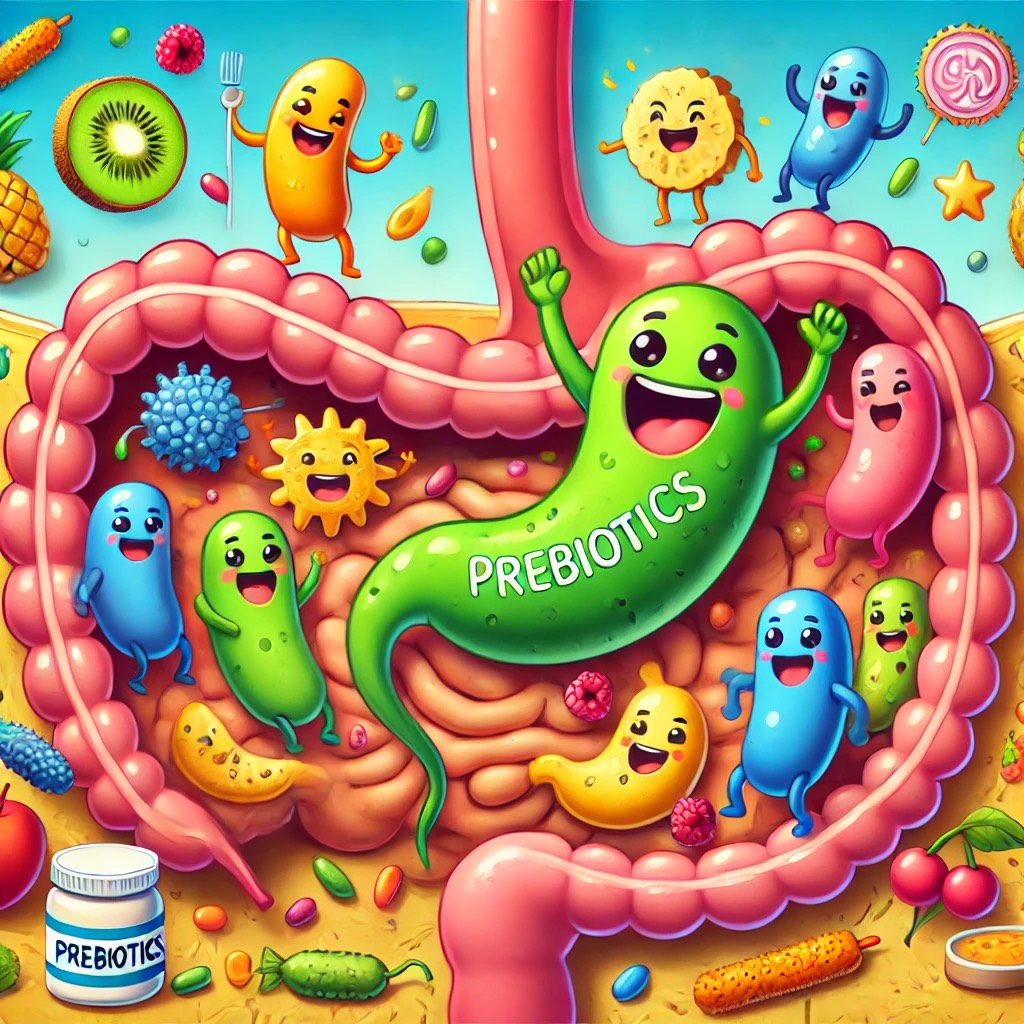22 Best Prebiotic Supplements for Gut Microbiome
 Ladies and gentlemen, gather ‘round! It’s time to talk about one of the most important topics of all: prebiotics! If your gut feels like a war zone and your mast cells are throwing tantrums, it’s time to call in prebiotics, the gut whisperers! These are the Michael Jordan of fibers, the Marie Kondo of your digestive tract, making sure everything is tidy, peaceful, and how it should be.
Ladies and gentlemen, gather ‘round! It’s time to talk about one of the most important topics of all: prebiotics! If your gut feels like a war zone and your mast cells are throwing tantrums, it’s time to call in prebiotics, the gut whisperers! These are the Michael Jordan of fibers, the Marie Kondo of your digestive tract, making sure everything is tidy, peaceful, and how it should be.
Since there is plenty of talk about prebiotics, we want to clarify which supplements stand out from the rest. In this article, we will uncover nearly 20 of the best prebiotics on the market. Get ready for a happy and downright ecstatic gut as we start our journey through the wild world of gut health.
22 Best Prebiotic Supplements for Gut Microbiome
Inulin: The Party Starter
Inulin is like that one friend who organizes epic parties. Found in chicory root, inulin attracts the best gut bacteria and makes sure they’re having the time of their lives. In the British Journal of Nutrition, it was stated that inulin is so helpful in promoting growth that your Bifidobacterium and Lactobacillus never want to leave. It’s like Woodstock for your gut, minus the music, mud, drugs, and questionable fashion choices.
FOS: The Sweet Talker
If prebiotics were people, FOS would be the charmer who makes everyone laugh at dinner parties. Found in foods like garlic and bananas, these sugars sweet-talk your gut bacteria into sticking around and behaving. A study in Frontiers in Immunology says inulin makes mast cells calm down from the byproducts. FOS is so good at smoothing things over, even your mast cells will chill out. It’s like having a smooth-talking diplomat in your intestines, keeping the peace and making sure nobody spills the wine.
GOS: Chill Time for the Gut
GOS is the laid-back surfer dude of prebiotics. Found in dairy products and legumes, it’s all about keeping things cool and relaxed. A study in The American Journal of Clinical Nutrition found that GOS can make your gut so chill that even IBS symptoms start to take a hike. GOS is like the Bob Ross of the digestive world, everything is just happy little bacteria.
Acacia Fiber:
This is one of my favorites. Unlike others, this fiber rarely causes bloating or gas, just pure, unadulterated joy. Research in Gut Microbes shows that acacia fiber helps beneficial bacteria flourish while quietly reducing inflammation. It’s like having a bouncer in your gut, keeping the place safe while ensuring only the good bacteria get in.
Resistant Starch: The Gut Hero
Resistant starch is like Clark Kent, mild and unassuming until it enters your gut, where it transforms into a superhero. Found in green bananas and potatoes, it resists digestion until it reaches the colon, where it morphs into short-chain fatty acids that combat inflammation. According to Microbiome, resistant starch produces butyrate, an SCFA that tells inflammation to take a hike. It’s like having Superman in your gut, saving the day without needing a cape. There are some resistant starch supplements, BUT I prefer to just get it from my foods.
Apple Pectin: Jam Session Time
Pectin is the rock star of fibers. Though it is found in various fruits, it best used in supplement form. It gives your gut a jam session it’ll never forget, promoting the growth of good bacteria, while also binding to toxins and reducing inflammation. A study in Frontiers in Nutrition showed that pectin can make your gut sing with health benefits, including stronger gut barriers and happier mast cells. It’s like hosting a music festival in your gut, and everyone is invited, except your ex!
Beta-Glucan: The Immune Ninja
Beta-glucan doesn’t just support your immune system; it trains it like a sensei. Found in oats and mushrooms, this fiber turns your immune cells into ninja warriors. Research in the Journal of Nutrition found that beta-glucan boosts bacterial growth and the activity of macrophages and natural killer cells. It’s like giving your immune system a black belt and saying, “Go kick some pathogen butt!”
XOS: Cool Kid from Across the Tracks
XOS is like the new kid at school who instantly becomes popular. Found in plant fibers, XOS promotes the growth of Bifidobacterium and improves gut health faster than you can say “fiber.” According to Nutrients, XOS is like that friend who just gets along with everyone, so likable, even your immune system can’t help but smile. Though there is a lot of potential with XOS, I have had a tough time finding the right brand.
Arabinogalactan: The Gut Guardian
Arabinogalactan is like the guardian angel you never knew you needed. Derived from the larch tree, this fiber is a prebiotic and immune booster rolled into one. A study in Phytotherapy Research found that arabinogalactan not only helps your gut flora flourish but also enhances immune function. It’s like having a personal bodyguard for your gut, making sure everything runs smoothly. I like to use the Swanson brand of this supplement. It is not like others on the market. It is patented, effective and affordable.
Psyllium Husk: The Tidy Up Crew
Psyllium husk is like the ultimate cleanup crew for your digestive system. Found in the seeds of the Plantago ovata plant, this fiber swells up with water and sweeps through your gut like a vacuum cleaner. A study in the World Journal of Gastroenterology showed that psyllium can improve bowel regularity and support the growth of beneficial bacteria. It’s like having a Roomba in your gut, tidying up and making sure everything runs smoothly. Be careful though because too much of a good thing with this can cause uncomfortable side effects.
Galactomannan: The Sticky Solution
Galactomannan is the adhesive you never knew you needed in your gut. Derived from guar gum, this fiber helps form a gel-like substance in the digestive tract. By doing so, it slows down digestion and promotes the growth of good bacteria. According to a study from the Journal of Food Science and Technology, galactomannan reduces inflammation, soothes the gut lining, and supports overall gut health.
Other Prebiotic Supplements Worth Mentioning
The supplements worth mentioning are raw bovine colostrum, bee propolis, wolfberry extract, marshmallow root, grape seed extract, mimosa pudica, flax meal, chia seed, humic/fulvic acid, and resveratrol. Though they didn’t make the list, these are just as important as the rest. These can all promote the growth of good bacteria by upregulating their metabolism and reproduction rate. In addition, they suppress the growth of pathogens, making them unique and quite valuable.
Frequently Asked Questions about Prebiotics
Which of these prebiotics do you like the most?
Raw colostrum helped me the most by far. It literally changed my life. I gained over 50 lbs back within 6 months of starting it. Outside of colostrum, I am a big fan of acacia fiber, FOS, arabinogalactan, flax meal, and pectin. I also have had very good experiences with bee propolis since it acts both as a prebiotic, immune modulator and antimicrobial.
How do you properly dose prebiotics to minimize side effects?
You always want to start off slow with prebiotics. This is because your body has to get used to breaking down that type of fiber. Keep in mind, if you only have a small amount of good bacteria, you may have to increase these prebiotics very slowly until the population grows. Once you have gotten the body used to it, you can test to see what the upper limit is. This must be a dose that provides benefit without increasing bloating or constipation.
Have you had negative experiences with any of these prebiotics?
I have used galactomannan and had issues with constipation after. It may have been due to the brand, but it was not a good fit for me. You must be careful with anything sticky like that. Also, be careful with psyllium husk because using too much can cause obstruction. Keep in mind, small amounts of these prebiotics can promote bowel movements and larger amounts may do the opposite.
Are prebiotics actually more critical than probiotics?
Studies have shown that most of the benefits of probiotics are lost within 21 days after stopping. With prebiotics, you can take breaks and retain at least some of the gains in the bacterial community. In addition, these prebiotics carry plenty of benefits that the probiotics don’t possess on their own. So to answer your question, yes, I would say prebiotics are MORE important than probiotics.
How often should I use prebiotics, and for how long?
The answer depends on your situation. Ideally, you should choose a few of these probiotics and rotate them. If you are going to the bathroom more, and not bloating, then you are likely on the right track. If you are constipated or bloating more, you either have to reduce the dose or find another prebiotic that suits you better. Once you find the right prebiotics for you, I would remain on them for 3-6 months minimum, taking a few days off here and there.
Prebiotic Supplements are Your Gut’s Best Friend
If your gut is the dance floor, prebiotics are the DJ playing the perfect mix to keep the party going. From inulin’s epic gut parties to lactulose’s loyal friendship, these prebiotic supplements are your gut’s best friends. They feed the good bacteria, keep the mast cells from causing a scene, and support a balanced, happy immune system. So, let’s get this gut party started because a happy gut means a happy you!
If you have questions about gut health or prebiotic supplements, get in touch. This area is my specialty. I suffered for over a decade with severe gut problems before rebuilding my health. Now that I am healed, I help people in the same situation I was once in.
Happy healing everyone!
Matt Nedin, B.S.
Certified Holistic Nutritionist
EndSickness, Founder
Phone: (734) 846-8619
WhatsApp: +17348468619
Email: endsickness@gmail.com
References
Slavin, J. (2013). Fiber and Prebiotics: Mechanisms and Health Benefits. Nutrients, 5(4), 1417-1435.
Gibson, G. R., & Roberfroid, M. B. (1995). Dietary modulation of the human colonic microbiota: introducing the concept of prebiotics. Journal of Nutrition, 125(6), 1401-1412.
Vulevic, J., Drakoularakou, A., Yaqoob, P., Tzortzis, G., & Gibson, G. R. (2008). Modulation of the fecal microflora profile and immune function by a novel trans-galactooligosaccharide mixture (B-GOS) in healthy elderly volunteers. American Journal of Clinical Nutrition, 88(5), 1438-1446.
Kavanaugh, D. W., O’Callaghan, J., Buttó, L. F., Slattery, H., Lane, J., Clyne, M., & Sinderen, D. (2013). Exposure of Bifidobacterium to late bile acid stress leads to increased synthesis of chaperone and transcriptional regulation-associated proteins. Journal of Bacteriology, 195(12), 2680-2689.
Martinez, I., Kim, J., Duffy, P. R., Schlegel, V. L., & Walter, J. (2010). Resistant starches positively affect gut microbiota dynamics and metabolism. Gut Microbes, 1(2), 127-134.
Morris, E. R., & Morris, G. A. (2012). The effect of inulin and pectin on colonic bacterial fermentation: an in vitro study using a three-stage compound continuous culture system. Frontiers in Nutrition, 2(72), 1-9.
Talbott, S. M., & Talbott, J. A. (2012). Beta-glucan supplementation, allergy symptoms, and quality of life in self-described ragweed allergy sufferers. Food Science & Nutrition, 1(2), 73-81.
Patel, S., & Goyal, A. (2013). The current trends and future perspectives of prebiotics research: A review. 3 Biotech, 2(2), 115-125.








